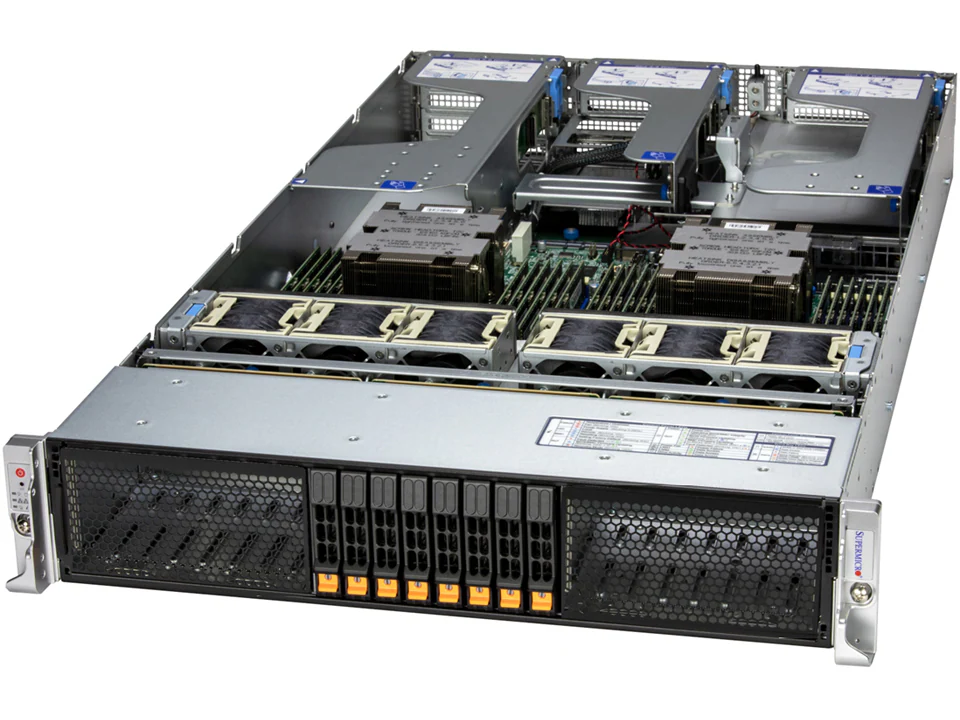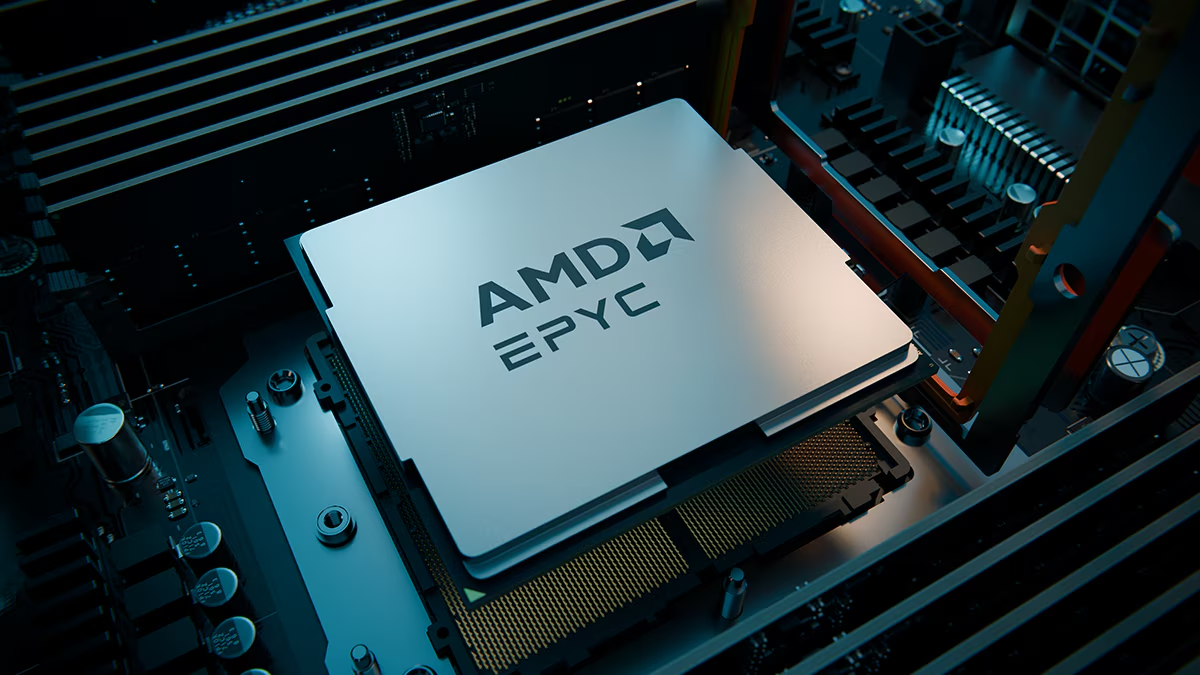When we talk about next-level server performance in 2025, the AMD EPYC™ 9965 stands out as a powerhouse in the world of enterprise computing. Designed as part of AMD’s advanced 9004 “Genoa” series, the EPYC 9965 is built on the Zen 4 architecture and brings unmatched performance to the table with 96 cores and 192 threads. This review explores what makes the AMD EPYC 9965 so exceptional, and we’ll dive into the top compatible server platforms—from Dell to Supermicro and HPE—that unleash its full potential across data centers, cloud services, and AI workloads.
Table of Contents
1. Introduction
Welcome to our comprehensive review of the AMD EPYC™ 9965, a server processor that’s reshaping data center expectations. With massive core counts, industry-leading performance-per-watt, and rock-solid enterprise security, the EPYC 9965 is not just another CPU—it’s a strategic powerhouse for modern workloads like AI, big data analytics, and massive virtualization stacks.
In this review, we’ll cover every detail: from AMD EPYC 9965 specifications to compatible platforms from Dell, HPE, Lenovo, and Supermicro. Whether you’re scaling a cloud-native stack or deploying edge compute, this article is your deep dive into the heart of AMD’s server CPU game in 2025.
2. Overview of the AMD EPYC™ 9965 Processor
The AMD EPYC 9965 belongs to AMD’s 4th Gen “Genoa” family built on the Zen 4 architecture. It features:
- 96 cores / 192 threads
- Built on 5nm process node
- Support for 12 channels of DDR5 memory
- Up to 160 PCIe Gen5 lanes
- Support for CXL 1.1+ interconnects
- Advanced I/O die with integrated security features
AMD designed the EPYC 9965 for customers needing high-density, high-throughput compute capability with scalable memory and IO bandwidth. Whether it’s for public clouds, large databases, or virtualized environments, EPYC 9965 handles it all.
Read Also
- PowerEdge XE9680 Review: Unleashing Ultimate AI and HPC Server Performance
- AI and Machine Learning Integration in Cloud Services: Trends for 2025
3. Key Specifications and Architecture
| Feature | Details |
|---|---|
| Cores / Threads | 96 / 192 |
| Base Clock Speed | ~2.4 GHz |
| Max Boost Clock | ~3.6 GHz |
| L3 Cache | 384 MB |
| Process Technology | 5nm FinFET (TSMC) |
| TDP | 360W–400W (configurable) |
| Memory Channels | 12x DDR5 up to 4800 MT/s |
| PCIe Support | PCIe Gen 5 (160 lanes) |
| Socket | SP5 (LGA6096) |
This architecture provides exceptional bandwidth and concurrency, ideal for database clustering, parallel compute, and real-time workloads.
4. Performance Benchmarks
Performance tests have placed the AMD EPYC 9965 well ahead of competing Xeon chips in several areas:
- SPECint® 2017: 1.4x better than Xeon Platinum 8490H
- SPECfp® 2017: 1.6x improvement over prior-gen EPYC CPUs
- Virtualization: Supports >100 VMs per socket with reduced latency
- AI inference & training: Works efficiently when paired with GPUs via PCIe Gen5
In HPC workloads, the 9965 delivers industry-best compute density, making it perfect for universities, labs, and research centers.
5. Power Efficiency and Thermal Performance
AMD EPYC 9965 achieves top performance without excessive power draw:
- Performance-per-watt leadership over Intel Xeon Scalable
- Configurable TDP range lets you optimize thermal envelopes
- Best-in-class efficiency at idle and under mixed load
When paired with energy-efficient server chassis, the EPYC 9965 offers greener operations—making it a favorite among sustainability-driven data centers.
6. Security Features of AMD EPYC 9965
Security is baked into the silicon. With AMD Infinity Guard, organizations get:
- Secure Encrypted Virtualization (SEV-SNP)
- Secure Boot, Memory Encryption, and TPM 2.0 compatibility
- Hardware Root-of-Trust features
- Real-time threat detection with firmware protection
For companies managing sensitive or regulated data, these features make the EPYC 9965 a fortress.
7. Compatible Server Platforms
The AMD EPYC 9965 is supported by a wide variety of enterprise-grade servers. Here are some of the top platforms:
✅ Dell EMC PowerEdge (EPYC-based):
- PowerEdge R7525
- PowerEdge R7625
- PowerEdge C6525
✅ HPE ProLiant:
- HPE ProLiant DL385 Gen11
- HPE ProLiant RL300 Gen11
✅ Lenovo ThinkSystem:
- ThinkSystem SR665 V3
- ThinkSystem SR675 V3 (GPU-optimized)
✅ Supermicro A+ Series:
- AS -8125GS-TNHR (GPU-heavy AI server)
- AS -1115HS-TNR (Hyper-scale optimized)
These servers are designed to fully leverage the 12 DDR5 memory channels and PCIe 5.0 lanes offered by EPYC 9965.
8. Dell PowerEdge Servers with EPYC
While Dell’s XE9680 is Intel-based, the PowerEdge R7625 and C6525 are designed for AMD EPYC 9004:
- R7625: Dual EPYC sockets, up to 24x DIMMs, and CXL support
- C6525: Dense 2U node for HPC clusters and virtualization farms
Dell’s iDRAC9 and OpenManage suite make it easy to integrate EPYC platforms into your IT ecosystem.
9. HPE Servers with AMD EPYC 9965
HPE has embraced AMD across both Gen10 and Gen11 platforms. Key models:
- DL385 Gen11: Balanced for virtualization and enterprise apps
- RL300 Gen11: Built for cloud-native workloads with massive efficiency
HPE’s Silicon Root of Trust works perfectly alongside AMD’s security stack, giving this combo added value in secure compute environments.
10. Lenovo Servers Powered by EPYC
Lenovo ThinkSystem SR665 V3 and SR675 V3 are excellent EPYC 9965 carriers:
- SR665 V3: Enterprise-grade with 12 NVMe support and GPU expansion
- SR675 V3: Built for hybrid AI + HPC with AMD + NVIDIA synergies
These servers are popular in research, financial modeling, and video rendering due to their I/O versatility and compute density.
11. Supermicro AMD EPYC Solutions

Supermicro offers highly customizable AMD EPYC 9004 platforms:
- GPU Servers: Ideal for deep learning and LLM workloads
- Storage Servers: High-speed data streaming and backup
- Blade & Twin Servers: Perfect for space-constrained DCs
Supermicro excels in bare-metal deployments, edge environments, and academic compute grids.
12. Use Cases: Cloud, AI, HPC, and Virtualization
The AMD EPYC 9965 is a game-changer across verticals:
- Cloud Service Providers: Maximize VM density per rack
- Artificial Intelligence: High-speed I/O & memory for training
- High-Performance Computing (HPC): Precision simulations
- VDI & Virtualization: Enhanced CPU isolation and encryption
It supports open-source hypervisors (KVM, Xen), VMware ESXi, and Microsoft Hyper-V natively.
13. EPYC 9965 vs. Intel Xeon Scalable CPUs
Compared to Intel Xeon Platinum 8490H:
| Metric | AMD EPYC 9965 | Intel Xeon 8490H |
|---|---|---|
| Cores / Threads | 96 / 192 | 60 / 120 |
| Memory Channels | 12 (DDR5) | 8 (DDR5) |
| PCIe Gen | Gen 5 (160 lanes) | Gen 5 (80 lanes) |
| TDP | 360-400W | ~350W |
| Performance/Watt | Superior | Lower |
AMD clearly offers better value at high performance tiers.
14. Scalability and Futureproofing
The EPYC 9965 scales beautifully in:
- 2U and 4U chassis
- Single and dual-socket configurations
- Hybrid GPU + CPU environments
Its 5nm process node and CXL support ensure the platform stays relevant into the late 2020s.
15. Total Cost of Ownership (TCO) Advantage
Thanks to better efficiency and performance density, customers enjoy:
- Lower power costs
- Higher workload consolidation
- Fewer licenses for per-core software models
Even at a premium upfront cost, EPYC offers long-term ROI over Intel-based alternatives.
16. Deployment Considerations and Buyer’s Guide
Before choosing an EPYC 9965 server:
- Ensure your OS supports Zen 4 (e.g., RHEL 9, Ubuntu 22.04+)
- Pair with ECC DDR5 memory
- Use Gen5 NVMe drives for max throughput
- Choose vendors offering BIOS tuning and secure firmware updates
Look for server models that support redundant PSUs, airflow tuning, and remote management.
17. System Integrators and OEM Partners
Trusted system builders offering EPYC 9965 platforms include:
- Thinkmate
- ASRock Rack
- Tyan
- Penguin Computing
- Lenovo, Dell, Supermicro, HPE
Many of these also offer pre-configured racks for HPC, VDI, and AI.
18. FAQs
Q: Is AMD EPYC 9965 good for AI training?
Yes, with PCIe Gen5 support and high memory bandwidth, it’s ideal.
Q: Can I use it in a single-socket setup?
Absolutely, AMD EPYC CPUs are well-optimized for 1P servers.
Q: Is it available in cloud platforms?
Yes, major CSPs like Azure and Oracle Cloud use EPYC 9004 chips.
19. Final Verdict
The AMD EPYC 9965 redefines high-performance server computing in 2025. Whether you’re building an HPC cluster, deploying a private cloud, or rolling out AI-powered analytics, this CPU provides exceptional performance, scalability, and security.
When paired with industry-leading platforms from Dell, HPE, Lenovo, and Supermicro, the EPYC 9965 delivers the horsepower that future-proof businesses demand.
If you’re investing in infrastructure, AMD EPYC 9965 is not just a processor—it’s a platform for innovation.
20. Sources & References
- AMD EPYC 9004 Series Official Page, https://www.amd.com/en/processors/epyc-9004-series
- Dell PowerEdge AMD Servers, https://www.dell.com/en-us/shop/dell-poweredge-servers/sr/servers/poweredge
- HPE ProLiant Servers, https://www.hpe.com/us/en/servers/proliant-servers.html
- Lenovo ThinkSystem, https://www.lenovo.com/us/en/data-center/servers/
- Supermicro A+ Systems, https://www.supermicro.com/en/products/aplus

2 comments